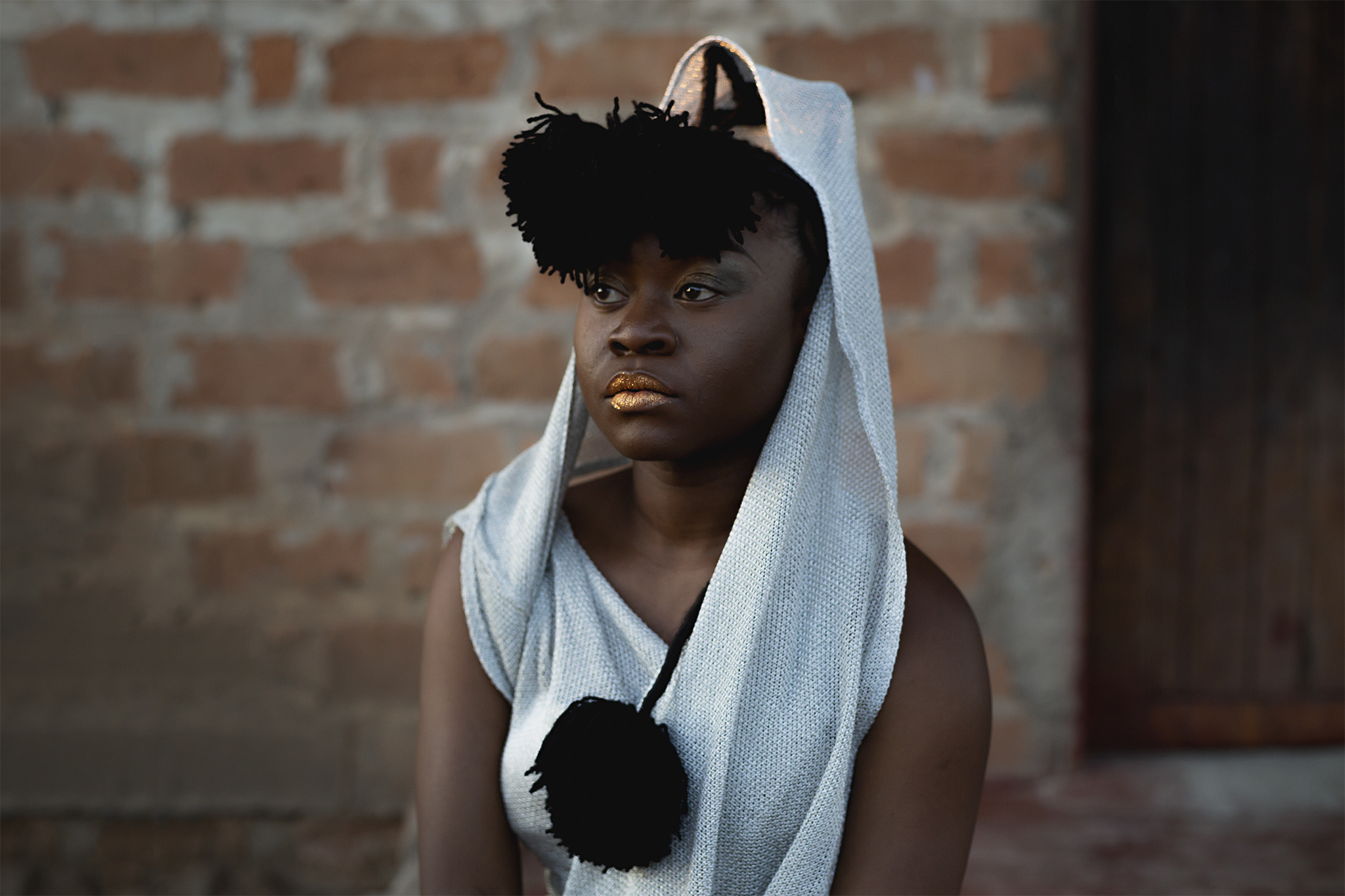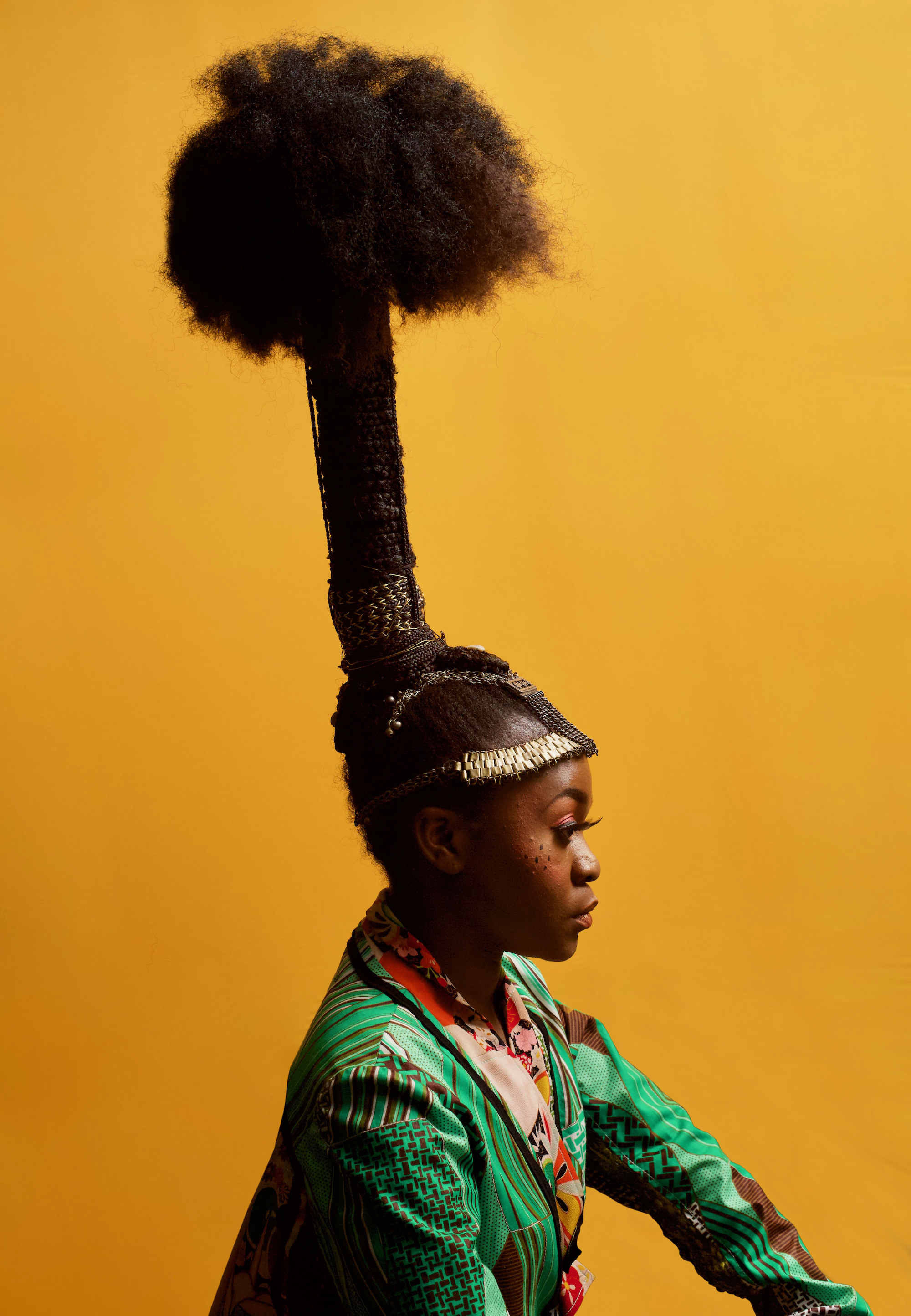SAMPA THE GREAT: The rapper is returning to her roots with a long-awaited debut album

Images: Barun Chatterjee
In the visuals for “Final Form”, Sampa the Great is coming home. Born in Zambia and raised in Botswana before studying in the U.S. and Australia, the rapper, singer and songwriter (real name Sampa Tembo) now lives in Melbourne. But for her debut album, Sampa returned to Africa in order to delve deeper into her heritage and the culture within it. “Final Form” serves as the album’s most defining celebration of her roots, featuring Nyau dancers, documentary-style footage and traditional dress; as she sings “Great state I’m in / in all states I’m in / I might final form / in my melanin”, while contemporary dancers chant “black power”.
The album’s title, The Return, is apt – but its release comes after two critically-lauded mixtapes, alongside supporting queen of hip hop Lauryn Hill and winning The Australian Music Prize last year. Originally arriving at music through poetry and spoken word (and childhood inspiration from Ms. Hill), Sampa’s music is unique, inquisitive and empowering, with songs such as “FEMALE” and “Black Girl Magik” intent on celebrating and lifting up the voices of black women.
The Return is an ambitious and intensely personal 19-track album, featuring vocals from her sister Mwanje, mother Teresa, and Sampa employing the language of the Bemba tribe from which her mother descends. Ahead of its release, we spoke to Sampa about her musical inspirations, overcoming adversity as a female rapper and what “home” means to her.

Starting from the beginning, can you tell me a bit about how you got into music – was there a certain point in time where you decided it was what you wanted to do?
You know, growing up I would choose to express myself through writing stuff in my diaries, so my journal became my poetry book. I always loved music, I’d perform it with my younger sister to my parents, but they would see it as a hobby thing. But it was only really until… two things happened, one was that in primary school there was a rap group of guys who performed, and I loved it so much, I was like ‘yo, you know I think I can join your group, I rap, I do poetry!’ and they told me that I couldn’t ‘cause I was a girl. And that was just like… wow. That didn’t make sense to me, and it was really sad. ‘Cause I actually loved poetry and words and lyrics and rap… and then I listened to Lauryn Hill, and I was like ‘wow, there’s someone that looks like me and is doing this, and is doing it very well. I think it’s something I can pursue’. No-one in my family had done it, so there was that big sense of insecurity, of doing this thing, actually, and it wasn’t until I had… I’d say as far as I released “The Great Mixtape” and performed it, that was when I was like ‘you know, I’m actually gunna take this seriously, I’m actually gunna be an artist’. So it was a small journey of assurance, but we got there.
You mentioned how the boys said you couldn’t join the group because women can’t rap. Have you faced any of that kind of adversity later on, coming up in the industry as a female rapper?
Definitely. That mentality is not just for little kids – where did they pick that up from? It’s obviously something that you know, comes from society, and I always say that if it’s a societal problem, it’ll always be an arts problem, because you know, art reflects life. And so, in the industry there would definitely be people who think – recently, Jermaine Durpi [saying] ‘female rappers all sound the same’. Just because you don’t look for those who don’t, you know… there’s different obstacles you face when people think you’re not an entertainer, versus a male entertainer, because of sexism. So it’s definitely something that I still face in the industry, and if it’s not outrightly said it’s still definitely a silent thing.
Exactly. And even if female rappers did rap about the same thing, it’s not as if male rappers don’t do that…
Yeah, like male rappers don’t! 100%.
A lot of your songs have a message of celebrating and uplifting women, especially black women. Can you tell me a bit about why this is so important to you?
I guess it’s partly because of that experience, and being like ‘well, if I’m being told this, I wonder how many other women or girls are being told this’. And then it was like, I proved that wrong by doing it anyway, and I think that was important. Plus I do come from a collection of strong women. My dad is dope, he is amazing and has pushed me throughout my life, but I also recognise what women have faced, especially black women, and still overcome that in tenfold. And I think that’s something that I’ll always want to champion, and always want to push because I am a woman myself, you know. It’s funny to answer that question because it’s like ‘why not?’, because I am one as well.
Was there an artist that provided that empowerment for you growing up?
Definitely Thandiswa Mazwai, a South African singer, most importantly because at the time it wasn’t cool to bring your culture to a global stage – that was something that was shunned for assimilation’s sake and for people to understand it. And she didn’t care, she walked onto the stage with her traditional garments and was like ‘this is who I am, I’m going to sing a song and you don’t even understand the language to it, but it’s gunna be amazing’. That to me was like… it’s funny to say, but it was permission. We often look to that thing that’s recognisable to you as permission to be ourselves. To my younger self, that was permission.
So your debut album is out very soon, and it feels like a long time coming because you’ve released a lot of mixtapes and singles. But it’s called The Return, so how would you say that it differs from your previous work?
If we’re not talking musically, it’s definitely a more assured me. Australia is where I started music professionally, and it would get to a point where people would be like ‘she’s Australian’, and not care so much for where I was born or raised or the story behind that. I think for me in going home and performing shows there, and showing my parents [who appear in the music video for “OMG”] and where I was raised and where I grew up, it felt like a full circle for me to be able to give my own narrative to my story, and not feel like there’s a separation between who I am, where I’m from, where I’m based and where I work. Because I’m based in a different place than where I’m from, there was a sense of homesickness, and it didn’t allow me to be content with where I am in my career. Amazing things happened and I was like ‘yeah this is dope but I wanna go home’. It wasn’t healthy, and it didn’t allow me to live in the moment and grasp what was happening, until I addressed the homesickness, and not quite feeling at home. I had the choice to go home or not, so that opened up the topic of home – what is home? And can you create a home within yourself when you can’t go home? It’s so big and broad, and you come to the conclusion that home is within yourself. I think we delve into all those topics throughout the album, to land at that conclusion.
And you’re going to release a short film about your experience going home, right?
Yeah, about everything! Even going home, we took BTS of my school and the teachers, and our house and home life, just to give more of a story of who I am and the story behind the music. Often we just hear the music and we’re like ‘yeah this is what it is’. This is like… let me create my narrative and my story and share that with you. Whatever you do with that is on you, but I know enough to show who I am and where I’m from.

You recently released the song “Final Form” from the new album. Can you tell me a bit about the lyrics – are you referring to yourself being in your final form?
It’s more of a journey… I hope it’s not my final form! It’s about being an artist in the industry and knowing your goals that you wanna reach, but knowing that there are steps to take to reach there and not being frustrated with that in between stage.
You’ve said that “fear has held you back so much in the past”, what’s changed now?
It’s less of a defining factor in what I do. Before, it was because I didn’t see people from where I’m from, doing what I was doing. And you could say that about my childhood – you didn’t see it so it wasn’t a reality. That’s why representation is so important. But now it’s more, I’m doing what I’m doing and I really love it, so there’s a sense of reassurance there. So now you walk into a room and it’s like, ‘I love what I’m doing, what more can I learn?’ Rather than, ‘what do people do here, and how am I supposed to sit quietly in the corner?’ I think that’s the difference with now. The fear was just of the unknown to be honest. Not that things are known now… but it’s okay to not know them.
You’ve also said of your song “Freedom”, that it’s about “the compromises made while navigating this industry, remembering that there are human beings behind the art and the music”. Can you tell me a bit more about those compromises that you’ve had to make?
You’re on certain programs and TV, and what does that mean, being on those stations or radio shows, and what do you have to lose from yourself to be on those things? If I make it more relatable to my life, for me it’s that health and wellbeing is 100% the most important thing to me. And in this industry, you’re doing a lot, you’re touring… there’s no real sense of ‘wait, maybe they should rest’. You have to love the person behind the music as much as you do the music. There’s a human being there that needs everything a human being needs. That’s definitely been something that’s not only been apparent in my journey, but with a lot of people I know. There definitely had to be a song about that. We’re doing what we love and want to continue making the music, but we also wanna make sure that it’s not detrimental to us.
And you recently did your first live film score, for Girlhood, how was that?
It was amazing. I’ve always loved visual media – I actually went to school for it, even though I didn’t finish it. I’ve always loved it, because I just feel like it’s another form of communication, and to me my goal would be to learn every form of expressing, whatever avenue it is… so to me, film and visual media is becoming a very important one. When I was approached to do it, I thought this was something that was bigger than me. It’s film and music, I love them both. I didn’t think that I could do it, until I actually sat down and wrote down the process, and was like ‘this is actually really about the music behind the story you’re watching’. You create the emotions behind that and you read what the crowd is supposed to feel. And I was like ‘this is what we do anyway!’ So it was amazing to actually be a part of that process and help create that. I would love to do that again, it’s so exciting and new.
Is there another film that you’d love to provide the soundtrack to?
There’s so many! It’s too broad. I’d start small with short films… for this, it was choosing songs that I’ve already made, and translating that to the film. But I’d love to make a song from scratch for a film. But [providing the soundtrack for] a movie would be running before I can crawl, so I’d definitely do a short film first.
Can you tell me a bit about your process for making music, and how it’s changed? Do the lyrics come first, or the beats?
It varies… I never have an answer for that. It’s either like, I wrote lyrics or poetry about something that inspired me in life, and then someone plays the keys while I read my poetry… or the other way round, somebody plays guitar and I’m like ‘this makes me feel this’, and I start singing or rapping to it. It varies, which is what’s changed. Before it was like, here’s a beat and we’ll rap to it. Now it’s like, whatever realm we want to express, we’re gunna go there.
So I saw you last summer supporting Noname, and you played Glastonbury Festival for the first time this year. Do you have a favourite venue that you’ve performed in, or anywhere that you’ve set your sights on next to perform?
It’s so funny, for someone who loves performing I’ve never really set a goal for where I’ve performed. I know my goals musically, but never performing – why? I think it’s because I started with performing spoken word in the smallest, intimate spaces. Wherever it is, it was like ‘wow this is big!’ I think my most memorable shows to date would have to be supporting Lauryn Hill, because of what that meant to me. That was amazing. Glastonbury was dope, but I didn’t know the scope of it until after the performance, when we went to the main stage and I was like ‘this is huge’!
I read that your set clashed with Lauryn Hill’s…
Yeah… I was like ‘I’m just gunna act like this isn’t happening’. We had a festival the day after I think, where we did actually meet, and I got to be backstage. So I was like ‘it’s okay, I’ll see her at the festival, so let’s not discuss what’s happening right now’.
Jada Pinkett-Smith has also shouted out your music and videos a couple of times recently on Instagram. How was that?
Oh my gosh… I still to this day don’t know if it was a dream or not. It just keeps happening to me. She continues to share it [on Instagram] and I’m like ‘yo…’ I guess she heard the song and she liked it.
Do you have like a particular piece of advice, from a mentor or an artist, that’s really stuck with you throughout your career?
For me it’s not from an artist, it’s from my dad. And that is ‘keep your uniqueness’. Keep who you are with you, because that’s something that you can’t ever lose. That’s what makes you, you. And you can continue growing into whatever that is, but you keep that with you, because that’s what makes you special. And once you lose that, we lose you!
Your debut album is going to be out in the world very soon, and then you’ve got your short film coming out… but what’s next for you after that?
I guess it’s just doing things that I never thought I’d do, or exploring sounds that I never thought I’d be a part of. There’s a song on the album called “Leading Us Home” – I never thought that I’d make a song like that before. So losing that control, and letting the music be free to go wherever it wanted to go, regardless of what genre I’m being put in. I hope that continues to be a thing. I’m gunna express however!
The Return is out on 13th September.Words Hannah Holway